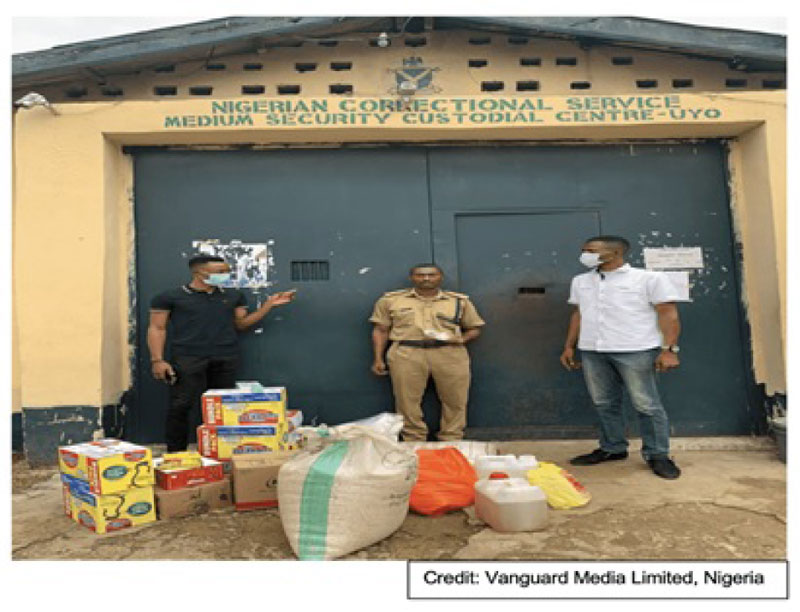All published articles of this journal are available on ScienceDirect.
The Homeless, Inmates and Refugees in Africa in the Face of COVID-19 Outbreak
Editorial
Total well-being and care for the vulnerable, especially the homeless, inmates, and refugees during the COVID-19 pandemic, is one of the barometers to measure Africa's response. Hence in the light of this scenario, our comment is on their care during this devastating period. We compared what is currently being done in the western world with what the African countries are doing. We have posed particular challenges with the welfare packages, the implementation of physical distances, good hygiene practices, limited access to screening and testing of COVID-19, as the outbreak invasion could be overwhelming if there is no intervention to bridge this gap. There is, therefore, an urgent need to consider welfare packages, an optimum hygiene environment, decongestion, and mass screening and testing for these groups of individuals, as they also have equal human rights to be protected during this pandemic.
Pandemic coronavirus disease-2019 (COVID-19) has no respect for any stratum, status, class or caste, and there is no doubt that the most vulnerable in society - homeless, inmates and refugees - will be hard hit. As of 1st May 2020, fifty-three (53) African countries reported a total of 1,629 deaths and 38,706 confirmed cases of COVID-19 (4.2% case fatality rate) as Comoros joins the list. Only seven (7) countries (South Africa-5,647 (14.6%), Algeria-4,006 (10.4%), Ghana-2,074 (5.4%), Nigeria-1,932 (5.0%), Cameroon-1,832 (4.7%), Guinea-1,495 (3.9%), and Cote d’Ivoire-1,275 (3.3%)) account for almost half of the cumulative confirmed cases in Africa [1, 2]. Total well-being and care for the vulnerable, especially the homeless, inmates and refugees, is one of the key indicators for measuring how well and strong African countries respond to the ongoing outbreak.
Approximately 1.6 billion people do not have adequate housing, 70.8 million displaced persons - 25.9 million refugees, 41.3 million Internally Displaced Persons (IDPs) and 3.5 million asylum seekers, with more than 11 million prisoners worldwide. South Africa (158,111), Ethiopia (113,727), Egypt (106,000), Morocco (82,512) and Nigeria (73,631) are the five African countries with the highest number of prisoners. South Sudan is at the top of Africa's refugee list, with 1.9 million internally displaced persons (Fig. 1). In Malawi, around 100,000 people were made homeless by floods in 2015, a quarter of a million are homeless in Kenya, and another 260,000 have been internally displaced in Mali. According to the United Nations High Commissioner for Refugees (UNHCR) [3-5], Nigeria has 24.4 million homeless, 650,000 internally displaced, and another 70,000 refugees in nearby neighboring countries to Nigeria [6]. We do not yet have any information on the screening and testing of COVID-19 to understand the dynamics of silent transmission that may exist between these groups of individuals in Africa, except for South Africa, which has begun screening and testing for inmates and homeless [7].
Prisoners around the world are mostly overcrowded, many with compromised facilities, food, health care, human rights and psychosocial needs. It is concerning that all these may be heightened during this pandemic. Country response was based on their peculiarities and pre-COVID-19 challenges, although many have similarities in their approaches. These vary from the suspension of prison visits, disinfection, sanitization, the release of some prisoners and, in some cases, the cancellation of an annual prison break for prisoners. South Africa, Kenya, Uganda and many other countries have closed their prisons to visitors for fear of a rapid spread of COVID-19. The same measure resulted in prison riots with reported casualties in Sudan and Nigeria. Morocco, Libya, Burkina Faso and Nigeria have released some of their prisoners in order to decongest and prevent the spread of COVID-19 in their prisons on the basis of criteria such as minor offenders, poor health, many years behind bars, pregnancy, child offenders, near release date and good conduct. Sensitization and awareness-raising in some prisons are taking place in Nigeria and South Africa, and food, soap and other sanitation materials are being donated (Fig. 2) [7, 8].


Leaving the homeless behind in the fight against the current pandemic poses a great danger to all. Although the incorporation of proper care for the homeless has been a challenge globally at this time. However, countries like South Africa initially used stadia and later moved homeless people to parks (Fig. 3) to prevent the spread of COVID-19 and also provided access for screening and testing. However, it is challenging to maintain social distancing and basic hygiene in these premises, while many other African countries have been silent about the needs of the homeless since the virus battle began, despite the closure of towns and cities.

United States, Holland and United Kingdom have reported infection among the inmates. In UK, 304 laboratory-confirmed cases and 15 deaths among prisoners and 5 among prison staff from COVID-19 as of the 1st May, 2020 with 1,783 “probable/possible” cases [8]. The Government of California made a budget of $150 million to cater for 150,000 homeless, while England planned to spend 3.2 million pounds for similar purposes. In France, EUR 15 million being spent on food vouchers during the pandemic, while 5,500 hotel rooms were provided for the homeless as temporary shelters during the lockdown. This calls on African countries to provide such care as to how South Africa and other countries care for the homeless and inmates; by leveraging the limited resources available to provide welfare packages, to provide access to screening and testing for the homeless, inmates, internally displaced persons and refugees during this outbreak.
CONFLICT OF INTEREST
The authors declare no conflict of interest, financial or otherwise.
AUTHORS’ CONTRIBUTIONS
OO conceptualized the idea and led the writing process. The manuscript was written by OO, BPA, AJM and FLMH. The final version of the script was read and approved by all authors.


